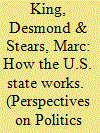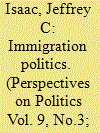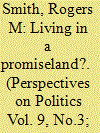|
|
|
Sort Order |
|
|
|
Items / Page
|
|
|
|
|
|
|
| Srl | Item |
| 1 |
ID:
110950


|
|
|
|
|
| Publication |
2011.
|
| Summary/Abstract |
Many existing accounts of the American state search for identifiable features of stateness recognizable from the comparative politics of state theory. These are less present in the US because of a distinct history, institutional separation of powers, and an ideological populism based in opposition to public sector expansion. Despite these constraints the American state is a powerful actor in US politics and has been since the nineteenth century engaged in familiar revenue raising, regulatory, public order, coercive, military, and distributive functions. To understand these we propose a framework based on how the endogenous drive to standardize shapes these functions and gives a distinct character to the American state. We identify impulses to standardize, instruments of standardization, and enduring obstacles to this agenda.
|
|
|
|
|
|
|
|
|
|
|
|
|
|
|
|
| 2 |
ID:
110949


|
|
|
|
|
| Publication |
2011.
|
| Summary/Abstract |
"You are a Greek Jew? I thought all Greeks were Orthodox?" As a Jewish-American growing up in New York City, whose paternal grandparents were Jews who had emigrated from Greece in the 1920s, I was frequently asked this question by well-meaning-if confused-friends and acquaintances. Indeed, while "Greek Jew" has always been a central aspect of my multiply-hyphenated American identity, in fact my grandfather Morris Isaac, né Izaki, was from Salonika and, it turns out, he himself grew up as a Turkish Jew under the Ottoman Empire, only to discover after World War I that he was in fact (now) not a Turkish but a Greek Jew (which was not, in the parlance of his time, synonymous with being an authentic "Greek"). Greek (Orthodox) or Jewish? Greek or Turkish? Pogroms, wars, "ethnic cleansings," and sometimes even genocides have been undertaken to resolve such questions, and indeed my ancestors experienced all of these things in the opening decades of the twentieth century. For my family, such traumas are part of the story of how my grandparents came to leave Greece and migrate to the US and become Americans and US citizens (alas, many of their relatives were not able to leave, and most ultimately perished at the hands of the Nazis).
|
|
|
|
|
|
|
|
|
|
|
|
|
|
|
|
| 3 |
ID:
110953


|
|
|
|
|
| Publication |
2011.
|
| Summary/Abstract |
The question of how to understand and address longstanding-and at times violent-hostility toward Mexican immigrants in the United States remains pressing. In his essay, Rogers Smith attempts to describe a just immigration policy, one that could ease anti-immigrant conflict, based on obligations upon the U.S. government that arise from its coercive shaping of the social identities and aspirations of Mexican immigrants. Smith is correct to focus on the conflicts between intersecting and contradictory factors that affect identity formation among immigrants, but I argue that a focus on similar conflicts among those who hold strong anti-immigrant views suggests that such contradictions may also be animating anti-Mexican immigrant hostility. Among the most important of these may be those arising from the American dream-a formative narrative that encourages euphoria about socioeconomic possibilities but that cloaks underlying economic instabilities, exploitation, and widespread vulnerabilities. The pain of these contradictions, typically unacknowledged by those whom they affect, can spike in times of economic downturn, exciting anti-Mexican immigrant sentiments that provide an outlet for the rage and agony of unresolved conflict.
|
|
|
|
|
|
|
|
|
|
|
|
|
|
|
|
| 4 |
ID:
110952


|
|
|
|
|
| Publication |
2011.
|
| Summary/Abstract |
Controversies over Mexican immigrants and undocumented aliens in Arizona and elsewhere show the need for fresh approaches to immigration. The "principle of constituted identities" holds that the more a government has coercively constituted the identities of non-citizens in ways that have made having certain relationships to it fundamental to their capacities to lead free and meaningful lives, the greater the obligations that government has to facilitate those relationships-all else being equal. The U.S. has coercively constituted the identities of many persons of Mexican descent, inside and outside its boundaries, in ways that have fostered aspirations for dual economic, cultural, and political "citizenships." It has also shaped the identities, values, and interests of many whites in immigrant-receiving states in ways that make Mexican immigrants seem threatening, even as it has made those states pay most of the costs of absorbing immigrants. In consequence, the U.S. should adopt policies that give priority to Mexicans in immigration and that facilitate dual citizenships, while providing more aid to immigrant-receiving states.
|
|
|
|
|
|
|
|
|
|
|
|
|
|
|
|
| 5 |
ID:
110951


|
|
|
|
|
| Publication |
2011.
|
| Summary/Abstract |
Recent research on the politics of contemporary policymaking has centered the contributions of diverse conservative forces. Conservatives are viewed as the chief proponents of marketizing reforms featuring retrenchment of social programs, privatization of social services, deregulation, and tax reduction, as well as of disciplining policies that impose more stringent behavioral requirements on beneficiaries, employ testing and reporting to monitor recipient performance, and impose sanctions for non-compliance. These developments are often viewed as fostering a less egalitarian politics, especially for historically disadvantaged groups.
I examine the rise of standards, testing, accountability, and limited school choice policies in federal education policymaking, which are widely viewed as embodying the same conservative interests and ideologies that have shaped policymaking in other areas. Contrary to this conventional wisdom, I show that certain civil rights organizations, not conservative forces, provided much of the impetus for federal standards, testing, and accountability reforms, which they viewed as measures for raising the achievement of disadvantaged students. Tracing the origins and consequences of these policies, my research reveals that entrepreneurial progressives can achieve significant legislative successes that they believe will accomplish progressive objectives. However, these policy victories have yielded mixed substantive results, and they have also unleashed complex and unanticipated consequences.
|
|
|
|
|
|
|
|
|
|
|
|
|
|
|
|
| 6 |
ID:
110957


|
|
|
|
|
| Publication |
2011.
|
| Summary/Abstract |
The uncertain political status of America's millions of undocumented immigrants and their children has exposed deep and ongoing disagreement about how US citizenship should be accorded to foreign-born persons. I identify the principle of jus temporis, a law of measured calendrical time, that has worked in concert with jus soli and consent to construct citizenship law since the nation's founding. Jus temporis translates measured durations of time such as "time in residence" or "time worked" into entitlement to rights and status. It creates temporal algorithms in which measured calendrical time plus additional variables (e.g., physical presence, education, or behavior) equals consent to citizenship. I explore recent scholarly references to temporal principles and trace the history of how jus temporis was invoked by the nation's first Supreme Court jurisprudence on citizenship and the first Congressional debates about immigration and naturalization. Scholarly convergence on the principle of jus temporis as well as its originalist pedigree imbue this principle with the potential to resolve contemporary disagreements about the rights and status of foreign-born persons in the US.
|
|
|
|
|
|
|
|
|
|
|
|
|
|
|
|
| 7 |
ID:
110956


|
|
|
| 8 |
ID:
110955


|
|
|
|
|
| Publication |
2011.
|
| Summary/Abstract |
The provocative question raised by Rogers Smith's "Living in a Promiseland? Mexican Immigration and American Obligations" is whether the tortured history of U.S.-Mexican relations and the racialized context of Mexican immigrant reception can best be ameliorated through targeted immigration policies that would create added opportunities for Mexican migrants relative to others. I argue that the current, more universally-principled system of U.S. immigration policy, supplemented by an inclusive legalization program, can better serve the needs of potential Mexican migrants and Mexican immigrants resident in the United States. Also, I am more skeptical than Smith is about the depths of Mexico's commitment to seeking binational strategies to address the needs of its émigrés abroad.
|
|
|
|
|
|
|
|
|
|
|
|
|
|
|
|
| 9 |
ID:
110954


|
|
|
|
|
| Publication |
2011.
|
| Summary/Abstract |
In his compelling piece, "Living in a Promiseland? Mexican Immigration and American Obligations," Rogers Smith argues that the greater the degree to which the U.S. has coercively constituted the identities of non-citizens in ways that have made having certain relationships to America fundamental to their capacities to lead free and meaningful lives, the greater the obligations the U.S. has to facilitate those relationships. Over the last hundred years, many rural communities in Mexico have been constituted more by U.S. immigration policy and the labor demands of U.S. employers than by similar policies and economic factors in Mexico. According to Smith, this means that Mexicans may be owed "special access" to American residency and citizenship, ahead of the residents of countries less affected by U.S. policies, and in ways that should justify leniency toward undocumented Mexican immigrants.
|
|
|
|
|
|
|
|
|
|
|
|
|
|
|
|
|
|
|
|
|